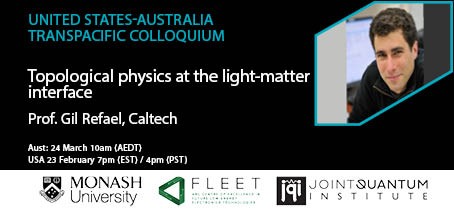-
24 Mar 2021
10:00 am - 11:00 am
If you missed the talk, you can catch it on YouTube
AUST 24 February, 10am (AEDT – Melbourne)
USA 23 February 7pm (EDT – New York) | 4pm (PDT – Los Angeles)
Prof. Gil Refael Taylor W. Lawrence Professor of Theoretical Physics, Caltech
Topological phases have been dominating the limelight in the past 10 years. They may provide a pathway to protected topological quantum computing, as well as reduced dissipation electronics. Their potential for new quantum devices, however, has been so far untapped. In my talk I will review the principles behind topological insulators, and then show how these ideas take a new life when applied to systems where light and matter interact. As I will show, the combination of photonics and topology gives rise to topological-polaritons, new paradigms for infra-red detectors and energy harvesting, and new methods for conversion and amplification of low frequency EM radiation.
Gil Refael is best known for his works on realizing Majorana fermions in solid state systems, and on quantum dynamics and control. Refael’s group has introduced the concepts of Floquet Topological insulators, and topological polaritons, and additionally worked on disordered magnets, superconductors and superfluids. Currently, he focuses on implementing concepts from topological physics to quantum control, as well as the microscopic origins of many-body localization. Refael is a recipient of a Sloan Fellowship, a Packard Fellowship, a Cottrell prize, and the Humboldt Foundation’s Bessel Prize. Refael graduated from Harvard University in 2003, where he worked under the guidance of Daniel Fisher and Eugene Demler.
Prof Refael is a FLEET partner investigator in FLEET’s research theme 3.
This talk is part of an ongoing series of talks by US and Australian researchers presenting novel developments in condensed matter and cold atomic physics, enriching connections between the two physics communities. Co-presented by FLEET, Monash School of Physics and Astronomy, and the Joint Quantum Institute.

